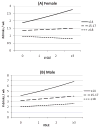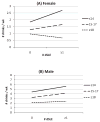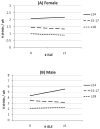The effects of age at drinking onset and stressful life events on alcohol use in adulthood: a replication and extension using a population-based twin sample
- PMID: 21895722
- PMCID: PMC3319316
- DOI: 10.1111/j.1530-0277.2011.01630.x
The effects of age at drinking onset and stressful life events on alcohol use in adulthood: a replication and extension using a population-based twin sample
Erratum in
- Alcohol Clin Exp Res. 2012 Jun;36(6):1116. Wolff, Kelly C Young [corrected to Young-Wolff, Kelly C]
Abstract
Background: A study by Dawson and colleagues (Alcohol Clin Exp Res 2007; 31:69) using data from National Epidemiologic Survey on Alcohol and Related Condition found earlier drinking onset age, and higher levels of past-year stressful life events (SLE) were associated with higher past-year alcohol consumption. The aims of our study were as follows: (i) to attempt to replicate this interaction; (ii) to extend it by examining sex and event dependence as potential moderators of the effect; and (iii) to estimate the roles of genetic and environmental factors in mediating the overlap of early drinking onset and SLE in their relations with alcohol consumption.
Methods: Data were from 1,382 female and 2,218 male drinkers interviewed as part of the Virginia Adult Twin Study of Psychiatric and Substance Use Disorders. Regression models were used to evaluate the main and interactive effects of early drinking onset and moderate or severe past-year SLE on past-year drinking density (PYDD), a weighted quantity-frequency measure of alcohol consumption. Analyses adjusted for demographic covariates and were stratified by sex and whether SLE were independent or dependent on the person's actions, as rated by interviewers. Structural twin models were used to estimate the degree to which early drinking onset, SLE, and their interaction accounted for additive genetic, common environmental and individual-specific variance in PYDD.
Results: We replicated the prior finding of a main effect of higher alcohol consumption among individuals reporting earlier drinking onset. Age at drinking onset accounted for about 5% of the variation in PYDD, and this association was mostly attributable to overlapping genetic influences. Evidence for an interaction between onset age and SLE was generally weak, possibly because of lower power and other methodological differences from Dawson and colleagues' study. However, there was some evidence consistent with an interaction of higher PYDD among early drinking men who experienced independent SLE and early drinking women with dependent SLE.
Conclusions: We confirmed prior findings of an association between early age at drinking onset with higher past-year drinking among young- and middle-aged adults and found limited evidence supporting a replication for higher stress-related drinking among early-onset drinkers. The association is consistent with early onset and stress-related drinking being attributable to overlapping genetic liability. Among early drinkers, our results suggest sex differences in consumption with regard to event dependence.
Copyright © 2011 by the Research Society on Alcoholism.
Figures




References
-
- Brennan PL, Schutte KK, Moos RH. Reciprocal relations between stressors and drinking behavior: a three-wave panel study of late middle-aged and older women and men. Addiction. 1999;94:737–749. - PubMed
-
- Brown GW. Life events and measurement. In: Brown GW, Harris TO, editors. Life Events and Illness. Guilford; New York: 1989. pp. 3–45.
-
- Buchmann AF, Schmid B, Blomeyer D, Becker K, Treutlein J, Zimmerman US, Jennen-Steinmetz C, Schmidt MH, Esser G, Banaschewski T, Rietschel M, Schumann G, Laucht M. Impact of age at first drink on vulnerability to alcohol-related problems: testing the marker hypothesis in a prospective study of young adults. J Psychiatr Res. 2009;43:1205–1212. - PubMed
-
- Buchmann AF, Schmid B, Blomeyer D, Zimmerman US, Jennen-Steinmetz C, Schmidt MH, Esser G, Banaschewski T, Mann K, Laucht M. Drinking against unpleasant emotions: possible outcome of early onset of alcohol user? Alcohol Clin Exp Res. 2010;34:1–6. - PubMed
-
- Cappell H, Herman C. Alcohol and tension reduction: a review. Q J Stud Alcohol. 1972;33:33–64. - PubMed
Publication types
MeSH terms
Grants and funding
LinkOut - more resources
Full Text Sources
Medical
Miscellaneous

